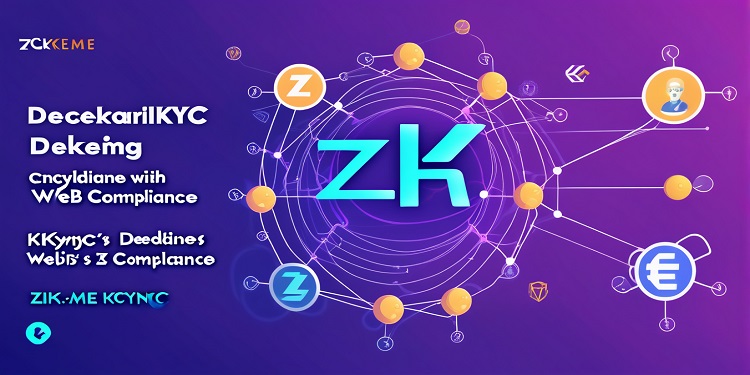zkMe has launched its innovative zkKYC solution, a decentralized Know Your Customer (KYC) service that leverages Zero-Knowledge Proof (ZKP) technology while ensuring full compliance with the Financial Action Task Force (FATF) guidelines. This advancement addresses the growing need for secure identity verification in Web3 without compromising user privacy. By employing zkKYC, the platform facilitates identity validation without exposing sensitive information, ensuring both privacy and adherence to regulatory standards.
Expanding Horizons with TON Blockchain
As part of its effort to drive broader adoption of decentralized compliance solutions, zkMe has integrated zkKYC with the TON Blockchain. This collaboration aims to make secure and user-friendly applications widely accessible, granting users greater control over their data while ensuring regulatory compliance. It also empowers participants in the TON ecosystem to manage data sovereignty effectively, overcoming traditional KYC challenges.
Challenges with Traditional KYC Systems
The growing demand for identity verification in the Web3 sector highlights the inefficiencies of conventional KYC systems. These systems, designed for centralized infrastructures, require users to submit personal information, such as government-issued IDs, financial details, and residential addresses, to centralized databases. Such processes introduce significant privacy risks due to vulnerabilities in data storage systems, exposing information to potential breaches and unauthorized access.
Furthermore, centralized KYC systems are both costly and inefficient. Organizations must allocate substantial resources to secure infrastructure while dealing with redundant data and inconsistent verification processes. These inefficiencies prolong onboarding procedures, leading to frustration for both users and businesses. Additionally, centralized systems are susceptible to cyberattacks, posing financial and reputational risks for organizations. The challenge of maintaining compliance with evolving global regulations further complicates these processes, exposing businesses to severe penalties for non-compliance.
ZKP Technology: A Decentralized Alternative
The decentralized nature of zkKYC, powered by ZKP technology, eliminates the need for centralized data storage. With this approach, users retain full control over their information, and businesses can verify identities without accessing raw personal data. This method enhances security and aligns with the principles of decentralization by ensuring privacy and transparency at scale.
How zkKYC Works
zkKYC operates by confirming the validity of user information through ZKPs. Users can demonstrate compliance with criteria like age or residency without revealing specific details. The platform includes several key features:
Proof of Personalhood: Confirms user uniqueness, deterring fraudulent activities like bot and sybil attacks.
Proof of Citizenship: Ensures jurisdictional compliance for region-specific platforms.
Interoperability: Seamlessly integrates with multiple blockchains and traditional systems.
Reusability: Allows users to apply zkKYC-verified credentials across platforms, reducing the need for repeated identity verification.
Implementation Steps for Businesses
Businesses can adopt zkKYC through a straightforward process. Platforms request identity verification from users, who then share encrypted credentials via zkMe’s zkKYC interface. The service verifies data securely and issues a compliance certificate, ensuring the user’s verified status without exposing sensitive information. This process complies with data privacy regulations like GDPR.
Streamlined User Experience
For users, zkKYC offers a seamless and secure verification experience. Encrypted credentials such as IDs or utility bills are uploaded to the zkKYC system, which uses ZKP to validate the data without revealing specifics. Verified users receive reusable credentials, enabling efficient onboarding across platforms while maintaining full control over their data.
The Impact of zkKYC on Web3
zkKYC addresses the limitations of traditional KYC methods by offering a privacy-centric solution that benefits both users and businesses. For users, it ensures data ownership and trust, while businesses gain a simplified compliance process. zkKYC’s design ensures compatibility with blockchain and traditional systems, making it a versatile tool for industries like decentralized finance (DeFi), NFT marketplaces, and cryptocurrency exchanges.
Use Cases in Web3
Decentralized Finance (DeFi): zkKYC helps DeFi platforms meet regulatory standards without compromising user privacy, fostering broader participation.
NFT Marketplaces: Provides privacy-protected verification for creators and buyers, reducing fraud and enhancing trust.
Crypto Exchanges: Simplifies user onboarding while maintaining compliance with global KYC and AML regulations.
Real-World Asset (RWA) Finance: Ensures compliance in asset tokenization, promoting transparency and trust among stakeholders.
Real-World Implementations
Several notable projects have successfully adopted zkKYC. Hinkal uses zkKYC to ensure AML compliance in privacy-centric DeFi transactions. Plume Network integrated zkKYC to provide secure, reusable compliance tools for real-world asset finance, enhancing scalability and cost efficiency. Xion Global streamlined Web3 payment processes using zkKYC, supporting its global expansion while maintaining regulatory adherence.
Looking Ahead
zkMe aims to further revolutionize Web3 compliance by expanding zkKYC’s capabilities, including advanced anti-fraud tools and real-time compliance monitoring. This approach positions zkKYC as a pivotal tool for the evolving decentralized ecosystem, fostering trust and facilitating the mainstream adoption of Web3 technologies.









